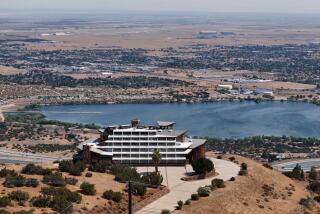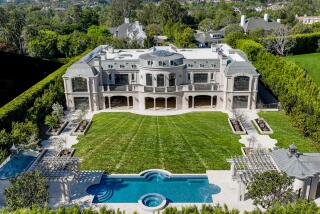The Russian Dream--Ranch House in Redding : Real estate: California property proves popular at Moscow auction despite high prices.
- Share via
MOSCOW — A ranch-style house in Redding, Calif . , went for a whopping 153 million at an unprecedented auction here this week--153 million rubles, that is.
For the first time in many decades, foreign real estate was sold for rubles, which are not freely convertible to foreign currencies, at an exclusive but highly publicized auction.
The house in Redding, in Northern California, was not the only property for sale.
A plot of land in Redding, four apartments in Spain and four houses in Australia were also offered.
But the American property was clearly the most popular.
“Just the fact that you can buy something in America is very attractive to Russians,” said Andrei V. Nikitin, general director of Banso, the company that organized the auction.
“Can you imagine being told for your whole life that America is the enemy--that America wants to fight us--and then learning that now it’s possible to buy a piece of America for yourself?”
The prices for the real estate were high, even in rubles. At the current official exchange rate, the small, three-bedroom home in Redding went for $2.8 million. At the special tourist rate, the house cost $1.4 million.
And even at the rate established at the most recent currency auction, where dollars and rubles can be legally traded, the house cost $665,217.
The American company selling the house was asking $247,500, Nikitin said.
Banso, a private auction house, used a rate of $1 to 560 rubles to figure the ruble prices, even though the latest currency auction price was 230 rubles to the dollar.
Banso’s ruble rate is extremely low because the company feared the rate would plummet even further because of hyper-inflation before it could complete the transaction, Nikitin said.
This unfavorable rate, Nikitin said, was the biggest reason that only six bidders ended up participating in the auction.
Several thousand businesses and individuals had contacted him about the chance to buy foreign real estate after reading about it in Commersant, a popular weekly business newspaper.
But few were willing to pay the 2,000-ruble fee to take part.
Participants were also required to prove their seriousness by paying 500,000 rubles up front, a sum that would be applied to any purchase made or returned if they bought nothing.
Another reason potential bidders were frightened away, Nikitin said, was the “Brooklyn Bridge syndrome”--fear of being taken. But overall, he said, the sale was a success.
“The most important thing to us was to set a precedent, and we did that,” Nikitin said.
“We sold the first American property for rubles in at least 74 years.”
The buyers of the American real estate were close-lipped about the companies they represent and about such questions as why they have so much money and what they intend to do with the properties.
The successful bidder on the Redding house, Yefim Kerelevich, said he was representing a private company but was not permitted to give any details.
Pavel Karin, who won, uncontested, the bidding on the land in the Redding area and lost out on the Redding house, said his company, which is part state-owned and part private, is buying the land to build a commercial facility.
He refused to say what kind of facility and said that the name of his company is a “commercial secret.”
The representative of the buyer of the only other property sold at the auction--a house in Brisbane, in southeastern Australia--was much more willing to talk about the purchase.
Konstantin Busargin, 34, director of Plus Three, a computer software and know-how company, said that his firm had read about the auction in Commersant and that he had traveled all the way from the industrial city of Ust Kamenogorsk, in the former Soviet Central Asian republic of Kazakhstan, to take part.
“We see it as a great investment,” Busargin said.
“This is the one way to be sure that we’ll get something from our hard-earned rubles and they won’t just be eaten up by inflation.”
Busargin said his company’s bank is financing 50% of the Brisbane purchase.
Plus Three plans to use the house as an opening to expand its business to Australia, Busargin said, and hopes that owning property abroad will also help it get credit with foreign banks.
Although many would-be purchasers were scared away because they found it hard to buy something they had not seen, Busargin said he was not fazed by that.
He was impressed by a videotape of the premises, which was shown before the bidding started, and he said he trusted the Australian businessmen involved in the deal.
“Besides,” Busargin said, “to be successful doing business here you often have to buy things sight unseen.
“We’re used to that.”
More to Read
Inside the business of entertainment
The Wide Shot brings you news, analysis and insights on everything from streaming wars to production — and what it all means for the future.
You may occasionally receive promotional content from the Los Angeles Times.










